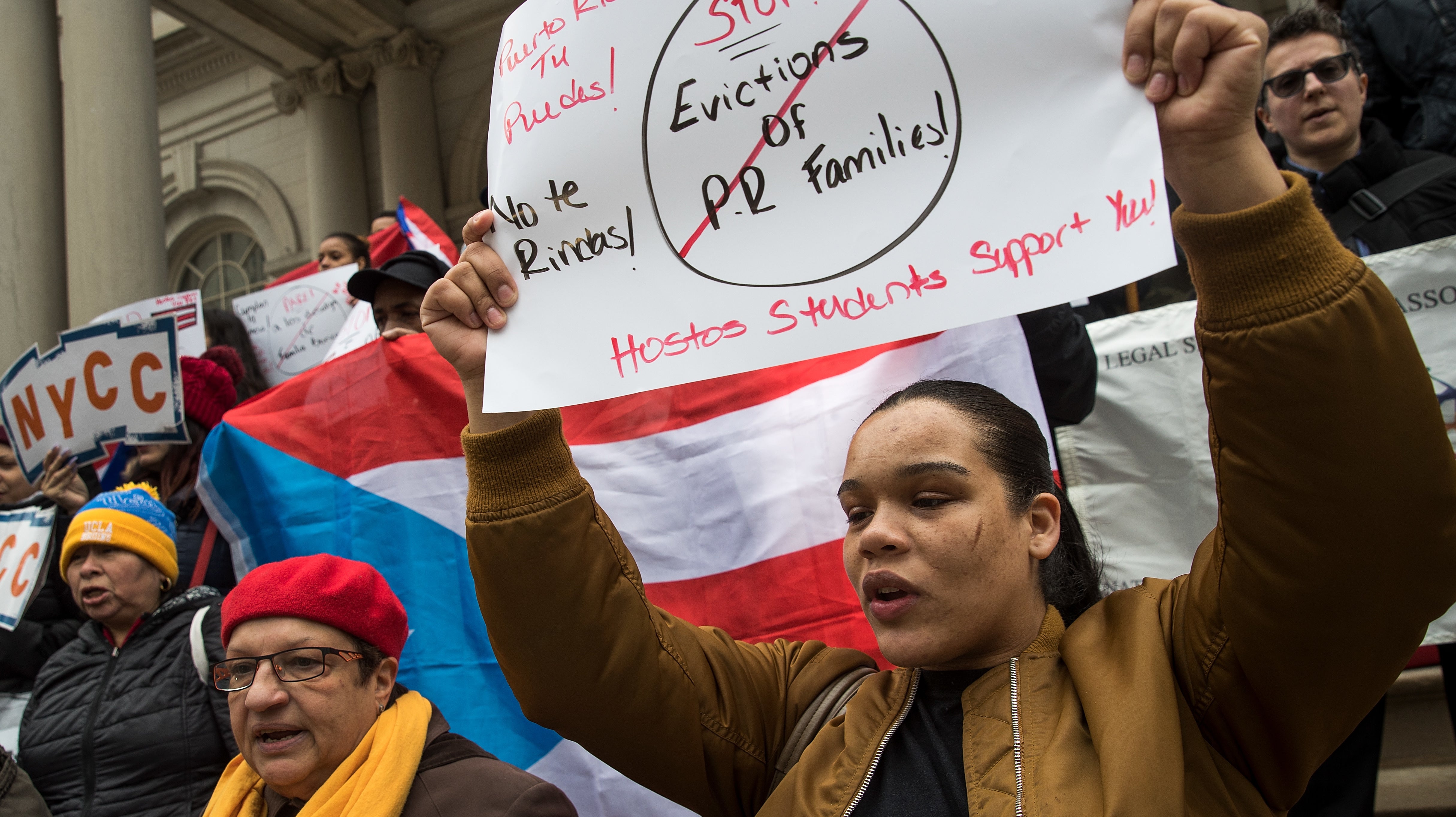
For those who’ve lost their homes since Hurricane Maria, the hits keep rolling. Over the weekend, more than 1,700 people displaced by the Category 4 storm nearly lost aid from the Federal Emergency Management Agency (FEMA). They were temporarily rescued when a court ruled Saturday to extend the housing assistance program until Tuesday.
That means these hurricane refugees, who are concentrated in states like New York, Florida, and Pennsylvania, can stay in their hotel rooms until at least Tuesday, and hopefully longer if this case leans in their favor.
Update 7/3/18 1:40 p.m.: On Tuesday, Judge Timothy Hillman pushed the date for FEMA aid to July 23rd as both sides wait to present their formal case. That means families won’t have to leave hotels by Wednesday, as previously expected.
National civil rights organization LatinoJustice PRLDEF filed a class action lawsuit Saturday, and District Court Judge Leo T. Sorokin in Massachusetts responded promptly to ensure these Puerto Ricans don’t end up on the street. That is the reality many face without their FEMA-covered hotel rooms: homelessness. And enough of these Hurricane Maria survivors are sick or require medical assistance for the judge to mention that concern in his response, too.“If a disaster of this nature affected everyone in Connecticut, which has a population of the about the same size as Puerto Rico, we would not have families needing to live in hotels almost 10 months late.”
“The irreparable harm to the plaintiffs is obvious and overwhelming,” Judge Sorokin wrote. “[Sunday] morning they will be evicted and homeless since, by definition, each plaintiff’s home was rendered uninhabitable by the hurricane in Puerto Rico, a determination previously made by the defendants. The public interest on balance favors the plaintiffs both in terms of their personal interests and considering the specter of many sick individuals without homes of their own being rendered homeless with the resulting drain on other public resources in addition to the possible human consequences.”
Some readers will probably grumble something along the lines of, “We can’t keep helping them forever!” Or, “They should’ve tried harder to find a home.” The thing is, it’s not so simple—even in cities like New York, whose government has been touting its support of Hurricane Maria survivors.
“The situation of Puerto Rican families displaced by Hurricane Maria goes above and beyond what we have seen in the United States when it comes to climate-induced housing crises,” said Father Jose Rodriguez, member of the VAMOS4PR steering committee who is also a minister at the Episcopal Church Jesus de Nazaret in Orlando, in an email to Earther. “What is happening to these families represents a perfect storm of colonial disempowerment, second-class citizenship, and local and state government disinvestment in affordable housing.”
Many of these families, especially those with a medically-frail relative, can’t just go back to Puerto Rico. At the same time, there isn’t enough public housing (especially in places like New York City or Orlando) that families who just lost everything can afford. Then, there’s the challenge of finding a job. These factors combine tomake it hard for many families to find a new permanent home.“We’re going to see this recurring issue as more people are affected by climate change.”
Rodriguez, for one, doesn’t think things would still be this fucked if the hurricane had hit a state instead of a territory.
“If a disaster of this nature affected everyone in Connecticut, which has a population of the about the same size as Puerto Rico, we would not have families needing to live in hotels almost 10 months later,” he went on.
As helpful as the FEMA extension is, it’s still not enough, said Jonathan Soto, the associate vice president of strategic initiatives for the Union Theological Seminary with Columbia University. Also a person of faith, Soto looks at the intersection of social justice and faith engagement. Once the FEMA extensions end, people must resort to shelters, he told Earther. If they’re lucky. Not all cities have a “shelter law” like New York. In places that don’t families might wind up sleeping out of a car or even on the street.
And this is just the beginning, Soto cautioned. These Puerto Ricans are not just displaced people: they’re climate refugees. “We’re going to see this recurring issue as more people are affected by climate change,” he told Earther.
For now, he hopes he can ease the minds of the families in New York that face the grim reality of being kicked to the curb. “They have no idea what the future holds for them,” Soto said.
The recent class action suit aims to extend FEMA assistance longer, but we’ll have to wait and see what the judge decides. The court is holding a hearing Monday. The fate of many families rests in the judge’s hands.